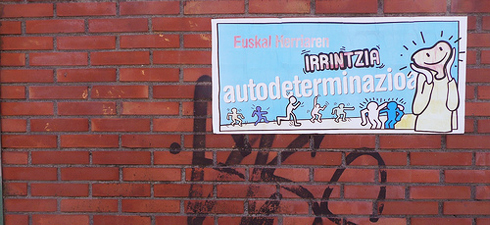On a huge map in his office Arnauld d’Arcanques points out one by one the golf holes that were destroyed. “Fortunately, the damage wasn’t as bad as we’d thought. We managed to fill the holes easily and didn’t have to close for a single day."
Mr d’Arcanques runs a golf course in Arcanques, a little village 10 km from the famous seaside resort of Biarritz. 15 years ago his family turned the grounds of the castle they have been living in for over nine centuries into a golf course. But early this summer somebody wrought havoc on the greens – and three other golf links have suffered the same fate elsewhere. Irrintzi, a Basque separatist movement close to ETA, in early August claimed responsibility for these acts of sabotage. "The Basque Country is not for sale” is their slogan, which they illustrate by calling the golf courses an “attack on Basque identity”. According to Mr d’Arcanques, they are a tiny group – and most Basques, himself included, are hostile towards them. “Tourism’s our livelihood, so why should we want to chase away the tourists?”
Irrintzi feel threatened by foreigners, particularly those of UK provenance, whose numbers have swelled since a low-fare airline commenced service to the area. Irrintzi call it an "invasion", even "colonisation". This is why the French Basque nationalists, unlike Spanish ETA, target not only those opposed to Basque independence, but also the tourist industry. They have struck several second homes and real estate agencies. So early this year British tourists were advised not to buy second homes in the Basque Country.
But that is precisely what Mark Bridges (46), a business executive in Manchester, intends to do: "It’s so beautiful here. And the weather’s gorgeous.” He disapproves of the Irrintzi attacks, though he does understand their disgruntlement “a little”: “House prices are going through the roof, which causes a feeling of helplessness and frustration.”
The French language, another great enemy
Jolen (19), a young Basque who would rather not reveal his surname, confirms that rents are apt to quadruple in the summer. "I’m still living with my parents, but my friends who live alone can’t make ends meet.” Jolen is a trainee at Xiberoko Botza, a Basque-language radio station, partly funded by the French government, in the small town of Mauléon. People see the Irrintzi attacks from a different angle in these parts: "Everything depends on your point of view,” concurs Joznes Etxebarria (28), a journalist also at Xiberoko Botza: "I don’t consider them as terrorists, but as armed combatants,” he says. "Personally, I wouldn’t resort to violence, but I don’t condemn it, seeing as, when it comes down to it, we’re fighting for the same cause: an independent Basque Country.”
For Extebarria, the real enemy is not so much tourism, but French culture, whose good intentions of trying to save the Basque language and culture are liable to smother it instead. "The State gives loads of money, but Basque culture is essentially a popular culture. It becomes folklorised when you try to keep it alive artificially.” He admits, however, that there are precious few young people left who want to learn Basque. "It’s very disappointing, especially now that we finally have the means at our disposal."
Irrintzi
French chef forced to save his bacon
Thus far, Irrintzi ("the cry" in Basque) have only targeted golf courses, second homes, real estate agencies, railways and political party offices. All told, they have carried out 28 attacks since 2006, the year the group was founded. Active in Iparralde, i.e. the French Basque Country, Irrintzi gained international notoriety when star chef Alain Ducasse finally decided to leave the province after three separate bombing incidents at his restaurant d'Ostapé. Small potatoes, of course, compared to ETA attacks, which have actually killed 800 people in Spain over the course of half a century.
Was this article useful? If so we are delighted!
It is freely available because we believe that the right to free and independent information is essential for democracy. But this right is not guaranteed forever, and independence comes at a cost. We need your support in order to continue publishing independent, multilingual news for all Europeans.
Discover our subscription offers and their exclusive benefits and become a member of our community now!












